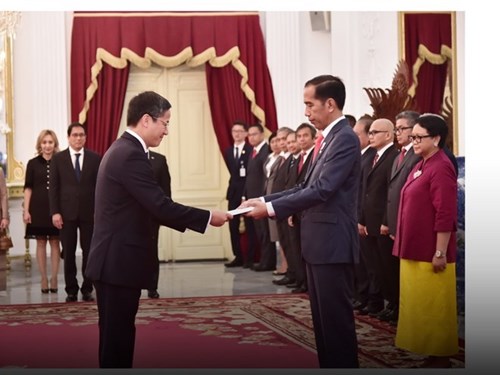In a recent interview granted to Indonesia-based Vietnam News Agency’s correspondents, Ambassador Quang highlighted common points in the two countries' foreign policies and pointed out what the two sides need to do in order to lift their bilateral relations.
    |
 |
|
Vietnamese Ambassador to Indonesia Pham Vinh Quang presents his letter of credence to Indonesian President Joko Widodo. Source: Antara |
He stressed the necessity to form new cooperation mechanisms, including expanding the exchange of visits at the deputy defense minister level and accelerating the signing of Memorandum of Understandings (MoUs) and cooperative agreements between their naval and coastal guard forces; as well as to strengthen bonds between Vietnam’s Ministry of Agriculture and Rural Development and Indonesia’s Ministry of Maritime Affaires and Fisheries.
Over the last five years, besides visits by high-ranking leaders of the two countries, their Foreign Ministers also regularly visit each other and conduct regular meetings of the Bilateral Cooperation Committee at the foreign ministerial level.
The two sides also have a cooperative mechanism within the Joint Committee on Economic, Scientific and Technological Cooperation. Cooperation has been also established among their ministries and sectors across the fields from defense, security to culture, tourism and people-to-people exchange.
Two-way trade between Vietnam and Indonesia recorded a sudden expansion, increasing four folds in the 2012-2017 period with an annual average growth of 6.5 percent. In 2017, their trade hit USD 6.7 billion, representing a year-on-year increase of 16 percent.
In the coming time, Vietnam will take concrete measures to lift the bilateral trade turnover to 10 billion per year, while working together with Indonesia to remove barriers and create favorable conditions for Vietnam's farm produce to enter the Indonesian market.
The two sides are also seeking to promote and increase investment in each country, focusing on infrastructure development.
Vietnam has experience in hydropower plant construction, while Indonesia is lacking in energy.
Vietnam can also send its laborers to Indonesia to carry out large projects, Quang said, adding that the two countries have potential to foster tourism and education link, and culture exchange.
The diplomat also highlighted the significance of the upcoming State visit by Indonesian President Joko Widodo to Vietnam in September and his attendance at the World Economic Forum 2018, saying that it aims to review achievements of the strategic partnership reached during the last five years and define new cooperation orientations and action coordination in the political and diplomatic fields.
The two countries have planned to sign an Action Plan for the next five years, aiming to make the bilateral relations stronger in the context that their relationship is enjoying many opportunities and also facing challenges.
In the context of complicated regional developments, Vietnam and Indonesia share common views not only on regional security but also at different forums, the ambassador noted, stressing that these are opportunities for the two sides to enhance action coordination.
According to the diplomat, Vietnam and Indonesia can work together in the United Nations Security Council. In 2018, Indonesia has been elected as a member of the UN Security Council and since early 2019 will assume the role of a non-permanent member of the UN Security Council. Vietnam is also likely to become a non-permanent member of the UN Security Council one year later, so both countries will have many opportunities to work together.
Indonesia leads in ASEAN in some areas, and Vietnam is also actively promoting links within the cooperation mechanism, with their common goal of enhancing solidarity among ASEAN member nations and increasing the bloc’s contributions to maintaining peace and security in the region and the world, including East Sea (South China Sea)-related issues.
Vietnam and Indonesia shared a common view of peacefully settling the disputes in the East Sea in line with legal process and with respect to international law, including the United Nations Convention on the Law of the Sea (UNCLOS) in 1982, Quang noted.
The two sides may cooperate at other multilateral forums which both Vietnam and Indonesia are members, he said.
According to the diplomat, the two countries can also work together on a number of negotiation process to promote trade liberalization.
Quang, however, pointed out a fact that there are some issues that need to be resolved, including those concerning fishermen.
The two sides have agreed that there are no major differences or contradictions in this regard, he said, noting that Vietnam and Indonesia have made progress in the work as the two countries signed an agreement on the demarcation of continental shelf in 2003.
This is an important step and now the two countries are continuing negotiations on the demarcation of the exclusive economic zones to ensure that both sides can effectively exploit marine resources, Quang said.
Regarding the fisherman-related work, Indonesia and Vietnam agreed on the basis of cooperation and humanitarian treatment in the spirit of the long-lasting friendship between the two countries, he added.
Source: VNA